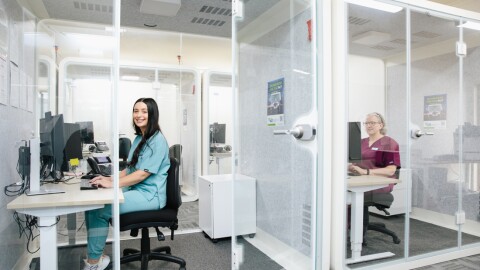From accelerated development and identification of new medications to alleviating the administrative burden for clinicians, there are many examples of its transformative potential. According to the World Economic Forum, the global healthcare AI market is forecasted to grow in value to almost US $188 billion by 2030, and we expect the Australian healthcare industry to greatly contribute to this.
At AWS, we are helping our healthcare customers improve operational and clinical efficiency, and ultimately enhance patient care with our range of specialised AI, and purpose-built solutions. We already work with many healthcare organisations across Australia, including St Vincent’s Hospital Melbourne, which leverages AWS cloud to provide a more robust, efficient, and scalable solution to manage patient data, and eHealthNSW, which uses Amazon Connect to enable real-time call transcription, sentiment analysis, theme detection, and automated access to knowledge base materials, helping its contact centre agents resolve healthcare inquiries more efficiently. Amazon Connect helps healthcare organisations improve patient interactions through AI-powered capabilities that streamline communications and deliver personalised engagement at scale. Our customers consider AWS a trusted technology and innovation partner, and we are committed to helping deliver better outcomes for all Australians.
Responsible AI at the core of healthcare transformation
AWS believes in building trust in AI by ensuring responsibility and innovation go hand-in-hand. That’s why we provide customers with industry leading AI tools that offer safety and protection at every stage of their AI journey. For example, Guardrails for Amazon Bedrock gives customers the ability to implement responsible AI policies, set application behavior boundaries, and implement safeguards against potential risks. It helps block up to 88 percent of harmful multi modal content, provides robust personal identifiable information (PII) detection capabilities, and helps to filter sensitive information.
Australian Epilepsy Project (AEP) selected AWS to support its AI journey. It leveraged its vast troves of data, which includes MRI scans, genetic tests, patient medical histories, and research participant surveys, to build a world leading, integrated epilepsy research platform on AWS. By embracing the power of AI and cloud computing on AWS, AEP is helping clinicians to better understand and treat the condition, and improve the quality for those living with the disease. The insights gained through AEP’s research are already helping to deliver a 30 percent reduction in seizure frequency amongst participants, and cutting neurologist assessment times by up to 70 percent, enabling more patients to be seen. As AEP’s research progresses, the insights and increased understanding of the brain opens up the potential to address more conditions, such as dementia or concussion.
Amazon Connect, our cloud contact centre service, helps healthcare organisations improve patient interactions through AI-powered capabilities that can streamline communications and deliver personalised service at scale. For example, eHealth NSW
Secure cloud foundation, secure healthcare innovation
Customers also select AWS based on our commitment to user safety, security, and privacy. Our aim is to ensure that providers, patients, and healthcare agencies have access to the right tools for the right use case, all while upholding our core principle that “security is job zero.” This commitment underscores our dedication to helping customers confidently and securely innovate, while maintaining the trust in the ever-evolving landscape of healthcare technology.
The Victorian Virtual Emergency Department (VVED), developed by Northern Health, transformed the traditional concept of the emergency room by diverting lower severity illness or medical conditions away from overcrowded hospital emergency departments, significantly reducing the strain on services. Since its launch in 2020, patients have been able to access free, on-demand consultations from the comfort of their homes 24/7, using either a computer or mobile device. Since its launch, VVED has served more than 550,000 patients across the state, with 83% of cases resolved without the need for a hospital visit. VVED handles an average of over 650 new patient registrations daily with a 99.9% uptime, and leverages AWS’s advanced security measures and rapid deployment capabilities, enabling VVED to evolve and scale at pace with emerging health crises and patient needs.
Collaborating with the industry to build a strong foundation for AI innovation
Ensuring Australian businesses can continue to deliver AI-powered innovation within the healthcare space will be influenced by the development of rules and regulations for the responsible use and application of AI.
A new study from Access Health International shows that Australia is a leader in the Asia Pacific and Japan region when it comes to developing frameworks and providing guidance around the use of AI in healthcare. The introduction of guidelines such as the AI Ethics Framework and the National Policy Roadmap for Artificial Intelligence in Healthcare provide clear guidance around transparency and accountability. But developing a solid foundation for Australia to harness all the benefits of AI within healthcare requires strong, ongoing collaboration between government, industry, and academia.
AWS recognises the Australian government’s efforts to find the right regulatory balance between driving greater AI adoption and innovation, while mitigating emerging risks and challenges through its
comprehensive and collaborative process to regulate the use of AI, including a focus on mandatory guardrails for high-risk settings which carries particular relevance for the healthcare industry.
We view that adopting a risk-based, sector-specific approach to regulation provides the flexibility to address and manage the impact of AI within a specific sector, accounting for different use cases and any potential risks, while also ensuring that there is still space for innovation in the early stages of AI development. This approach works well to allow regulators who understand the subject matter to make informed determinations about the risk of using AI for specific purposes, rather than attempting to introduce catch-all, blanket regulation.
The future of Australian healthcare will be shaped by our collective ability to harness AI technologies responsibly and securely. At AWS, we remain committed to being a trusted partner in this journey, helping to create smarter care systems that ultimately deliver what matters most – better health outcomes for all Australians.
Next up, AWS doubles down on helping Australian startups accelerate AI innovation.













